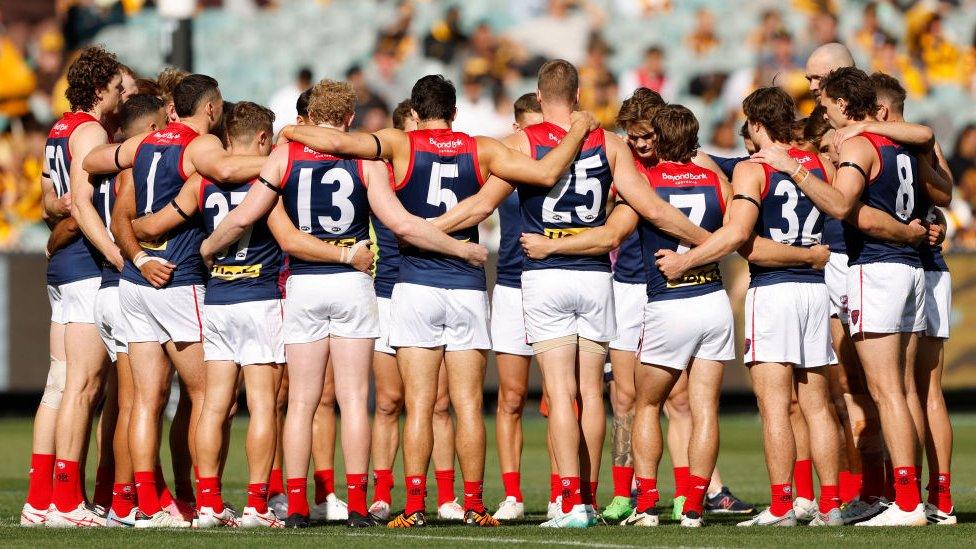Australia Football League denies it has a cocaine problem after whistleblower claims
- Published

The allegations have rocked the AFL and club the Melbourne Demons
The Australian Football League (AFL) has denied it has a cocaine problem, after whistleblowers claimed abuse of the drug is widespread in the sport.
In a speech to parliament on Tuesday, an MP accused the Melbourne Demons club - and the AFL broadly - of covering up breaches of the league's drug policy.
Players were being asked to fake injuries to avoid match day drug tests, Andrew Wilkie said.
The AFL's boss did not deny those claims, but said drug use was uncommon.
The Australian Rules football competition draws the biggest fan attendances of any sport nationally.
Mr Wilkie used parliamentary privilege to air the allegations, which he says were provided to him by three people. They are former Demons president Glen Bartlett, former club doctor Zeeshan Arain, and Shaun Smith, a former player and father to current Demons player Joel Smith.
In his speech, Mr Wilkie claimed "off-the-books" tests were conducted at a Melbourne pathology clinic and facilitated by a former AFL chief medical officer.
Players that tested positive were "advised to lie about their condition" and the results were kept secret from governing bodies like Sports Integrity Australia (SIA) or the World Anti-Doping Agency, and even team coaches, the MP said.
Those who test positive for illicit drugs on match days face penalties - including bans - under the anti-doping code.
"In other words, hundreds of thousands of Australians will watch the game not knowing that the game has been secretly manipulated by the AFL," Mr Wilkie said.
The Demons' coach said he was surprised by the claims and had no knowledge of the alleged practice. The team's captain has also previously denied the club has a drug culture.
In a press conference, AFL chief executive Andrew Dillon said the sport conducted its own illicit drug testing, on top of tests done by governing bodies.
"If there's a chance that they may have something in their system, we don't want them training and we don't them taking part in matches for their health and welfare above anything else," he said.
He did not address the allegation that footballers were told to fake injury so that others were unaware of their results, but said players had a right to doctor-patient privilege.
The AFL is reviewing its illicit drugs policy, he added, but the sport does not have a drug problem.
"What we're talking about here is a small handful of players over a year," he said.
Earlier this week two AFL Women's players from the Sydney Swans club were suspended for two matches each over cocaine possession.
And last month Joel Smith - who is suspended from playing - was accused by the SIA of possessing and "trafficking or attempted trafficking" cocaine. He has not been criminally charged.